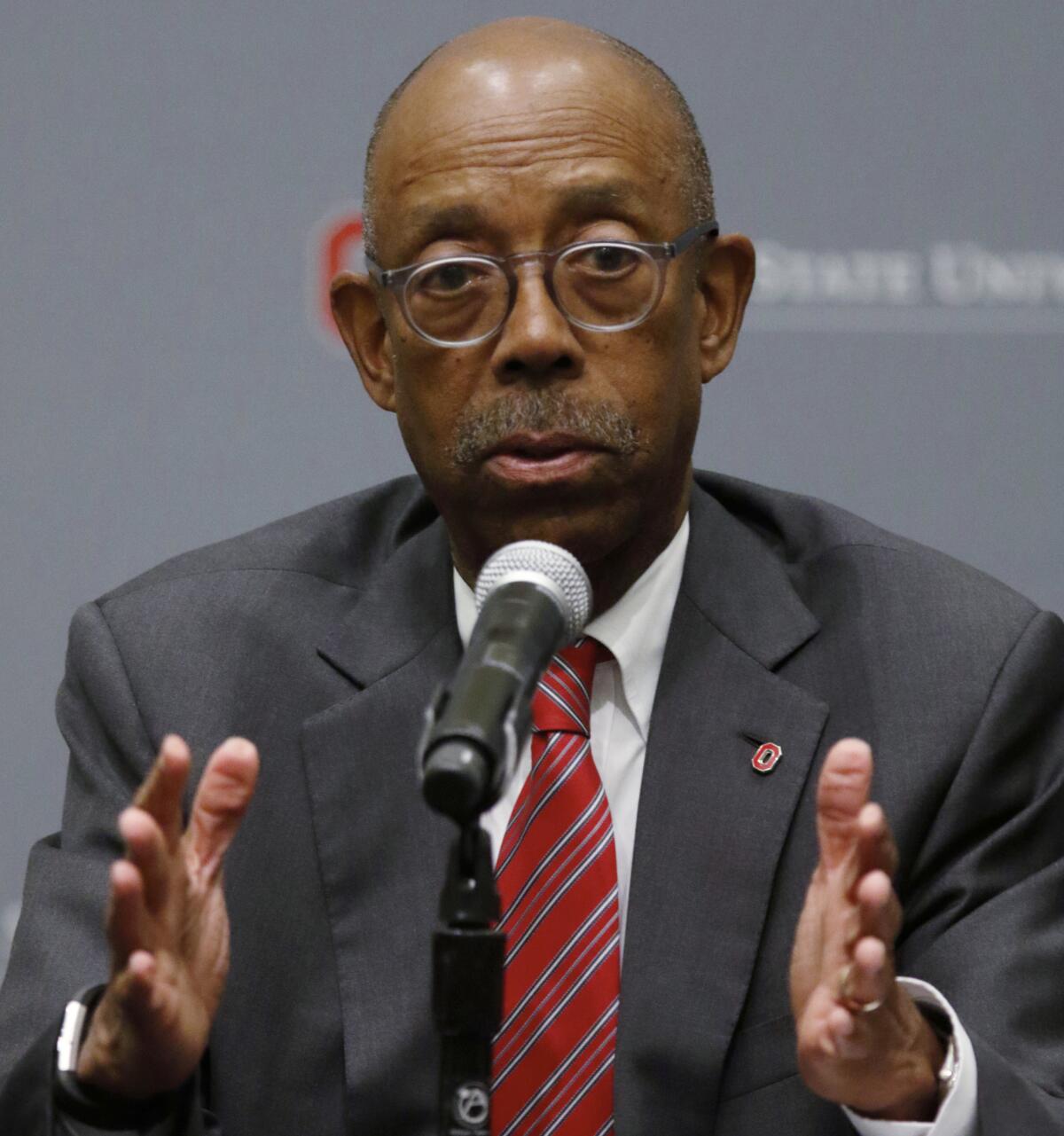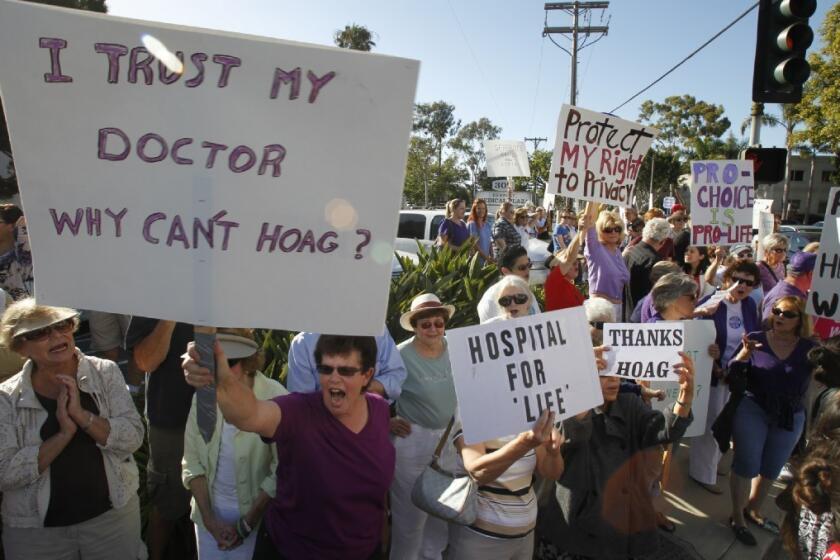UC faces more pressure to shun healthcare deals with Catholic hospitals, as it should

- Share via
The heat is being turned up on the University of California to start dropping partnerships with hospital chains that place religious restrictions on healthcare.
It’s about time. The issue of UC’s complicity with religious limitations on women’s reproductive healthcare, services for LGBTQ patients and end-of-life care has been simmering for nearly two years, or since UC San Francisco proposed expanding its affiliation with the Catholic hospital chain Dignity Health in 2019.
Two recent developments signal that the time for dithering may be coming to an end.
I could not in good conscience agree to a policy that allows us to continue affiliations with private healthcare operators that limit the delivery of medicine in any way that’s not based on science or the best practice of medicine.
— UC Regents Chair John A. Pérez
Last month, UC faculty members posted an open letter to university President Michael V. Drake, urging him to take a stand against affiliation agreements with institutions that restrict crucial health services for women and LGBTQ patients. The letter has attracted the signatures of some 2,500 UC faculty, students, alumni and staff.
And on Feb. 10, state Sen. Scott Wiener (D-San Francisco) introduced a bill barring UC from entering affiliations with entities that place “nonclinical” limitations on healthcare. In practice, that mostly means religious restrictions, though it also could cover limitations on services such as abortion imposed for political reasons or at the demand of community protesters or donors.
These two events pose a challenge for Drake, a medical doctor and former UC president for health affairs who succeeded Janet Napolitano as UC president last August. (In response to a request for comment from Drake, his office said that his “senior staff continue to carefully study the matter and to engage in robust discussions with stakeholders representing a variety of viewpoints.”)
Some members of the UC healthcare community say that the university can’t avoid affiliations with a variety of partners if it is to meet its obligations to treat medically underserved Californians and to relieve its own capacity constraints.
That may be so, but whether it means UC must accede to the standards of its outside partners is another question. The university is bound by the state Constitution to remain “entirely independent of all political or sectarian influence,” a mandate arguably violated by acceptance of religious standards of medical care.
The prestigious Hoag Hospital wants to exit its partnership with a Catholic healthcare system.
Religious and ideological encroachments on medical standards have been increasing in recent years.
As a UC committee examining its healthcare affiliations observed in 2019, “non-evidence-based policy restrictions on care that disproportionately impact women and LGBTQ+ people” have arisen from many sources. But the institutions imposing such restrictions “have mostly been affiliated with the Catholic Church.”
Hospitals operated by Seventh Day Adventists are also subject to that church’s religious strictures against abortion and assisted suicide.
But that church is open to contraception and in vitro fertilization, and in any case doesn’t have the broad footprint of the Catholic church, which is affiliated with four of the 10 largest health systems in the country. Dignity is part of CommonSpirit Health, the second largest hospital system in the U.S.
The church’s dictates are embodied in the Ethical and Religious Directives for Catholic Health Care Services, known as the ERDs.
A creation of the U.S. Conference of Catholic Bishops, the ERDs ban “direct abortions,” in vitro fertilization, medical and surgical methods of contraception, assisted suicide and “gender-affirming care” such as hormone treatments and surgeries for transgender patients. (“Direct abortion” is not a medical but a Catholic term, signifying the termination of a pregnancy by destroying a developing fetus anytime after conception.)
The ERDs vest the ultimate judgments about whether to allow those services, even in emergencies, to local bishops rather than doctors.
The ERDs command a Catholic institution affiliating with non-Catholic entities to ensure that its staff or employees will not “manage, carry out, assist in carrying out, make its facilities available for, make referrals for, or benefit from the revenue generated by immoral procedures” including abortions, assisted suicide and sterilization — all of which are legal in California.
That suggests that as a public entity, UC should play the role of a bulwark against the encroachment of religious or ideological standards of healthcare, not their enabler.
Put simply, UC owes responsibility to the public broader than the position of religious leaders — chief among them the role of science in medical standards.
“Whatever one thinks about Dignity’s choices about its own services,” Wiener says, “if Dignity is going to enter into a contract with a public hospital for that hospital to perform services at Dignity, it’s completely inappropriate for Dignity to insist that those UC physicians not be able to provide certain services.”
The UC Board of Regents, which will have the last word on the university’s affiliation policies, hasn’t yet taken a vote on the issue, and none is scheduled for its next meeting in March.
But board Chair John A. Pérez, who was a critic of the UCSF/Dignity proposal, says he’s opposed to any restrictions on UC healthcare practices.
“I could not in good conscience agree to a policy that allows us to continue affiliations with private healthcare operators that limit the delivery of medicine in any way that’s not based on science or the best practice of medicine,” Pérez told me.
UC’s report on making deals with Catholic hospitals came to no conclusion.
The announcement of UCSF’s expanded affiliation with Dignity Health served as a call to arms for critics of religious restrictions. The critics argued rightly that Dignity’s adherence to the ERDs was hopelessly at odds with UC’s devotion to science-based medicine and nondiscriminatory practices.
UCSF was ultimately forced to drop the proposal. But the issue remained live as it became known that UCSF and other UC campuses had entered into other contracts that imposed religious restrictions on UC professionals and trainees.
Protests of these deals spread across the university’s campuses and to its academic council. Then-UC President Napolitano dumped the issue in the lap of a 15-member “working group” of administrators and faculty members.
The group issued its report in December 2019, but it was clear that the members had punted. Unable to agree on a single recommendation, they offered the Board of Regents two options.
Option 1 required that UC affiliation contracts provide that UC personnel would be permitted to make clinical decisions, inform patients of all their healthcare options, prescribe any medically necessary and appropriate treatments and transfer patients elsewhere if the indicated treatments couldn’t be performed at a partner’s facilities.
Critics within the working group and throughout the university properly considered those terms a dodge. As the open letter to Drake explains, assuring professionals merely of the right to make decisions and issue prescriptions left open a loophole, since the option didn’t guarantee the right of doctors to provide those services or perform procedures.
“The most effective methods of contraception, assisted reproductive technology, abortion, and gender-affirming surgery cannot be obtained by ‘prescribing an intervention,’” the letter states. “They require that providers perform a procedure (e.g., IUD insertion, tubal ligation, uterine evacuation, hysterectomy) or deliver a service by dispensing a medication on site (e.g., medication abortion).”
Assurances that UC professionals would be able to transfer patients to hospitals free of religious restrictions subject those patients to medical risks in any relocation that could be life-threatening, the critics said.
The critics preferred Option 2, which added the crucial mandate that UC professionals be permitted to “perform procedures consistent with the standard of care and their independent professional judgment.”
The University of California regents are wrestling with a question that should have an easy answer: Should they approve an “affiliation” between UC San Francisco, one of the leading teaching hospitals in America, and Dignity Health, a Catholic hospital chain that openly discriminates against women and LGBTQ patients and requires its doctors to comply with religious directives, some of which run counter to medical science and ethical practice?
Since the issuance of the working group report, the matter has remained in limbo. Neither the regents nor Drake has moved the ball forward, even as contracts with outside partners continue to be written and renewed.
Wiener’s bill aims to end the stagnation. He says he’s been meeting with Drake regularly for months “talking through these issues and keeping open lines of communication. We’ve committed to each other that we’re going to do everything in our power to try to resolve this.”
Wiener’s measure could turn into a flashpoint for the battle over abortion rights, which is the impetus more of political base-building than medical debate.
Opponents may also question whether it would rule out UC affiliations with the Department of Veterans Affairs or the government’s Indian Health Service. Those agencies, which have relied on UC services, are subject to the government’s Hyde amendment, which bars the use of federal funds for abortions except in limited cases.
But no one should be distracted by that argument — government policies result from public debate, which puts them in a different category from the rulings of religious leaders.
The time is long past since the University of California should have taken a firm stand against healthcare practices based on ideology rather than science. Sectarian healthcare organizations have been moving their line forward, and UC is an ideal institution to lead a pushback.
If it takes legislation, so be it.
“I’ve made clear that the ideal resolution is simply for the regents to do the right thing,” Wiener told me. “In an ideal world we wouldn’t need legislation. But we haven’t made a lot of progress.” Introducing legislation, he says, is a way to “call the question.”
More to Read
Inside the business of entertainment
The Wide Shot brings you news, analysis and insights on everything from streaming wars to production — and what it all means for the future.
You may occasionally receive promotional content from the Los Angeles Times.









